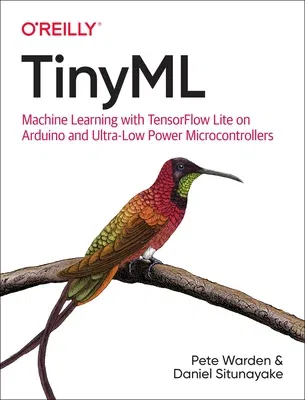Pete Warden
(Author)Tinyml: Machine Learning with Tensorflow Lite on Arduino and Ultra-Low-Power MicrocontrollersPaperback, 21 January 2020

Qty
1
Turbo
Ships in 2 - 3 days
In Stock
Free Delivery
Cash on Delivery
15 Days
Free Returns
Secure Checkout

Print Length
501 pages
Language
English
Publisher
O'Reilly Media
Date Published
21 Jan 2020
ISBN-10
1492052043
ISBN-13
9781492052043
Description
Product Details
Authors:
Book Format:
Paperback
Country of Origin:
US
Date Published:
21 January 2020
Dimensions:
23.29 x
17.81 x
2.57 cm
ISBN-10:
1492052043
ISBN-13:
9781492052043
Language:
English
Pages:
501
Publisher:
Weight:
793.79 gm